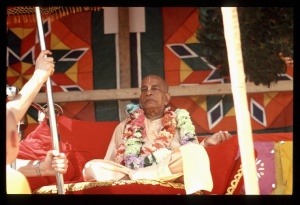SB 7.15.4: Difference between revisions
m (1 revision(s)) |
No edit summary |
||
| Line 1: | Line 1: | ||
{{info | {{info | ||
|speaker= | |speaker=Nārada Muni | ||
|listener=King | |listener=King Yudhiṣṭhira | ||
}} | }} | ||
[[Category:Srimad-Bhagavatam - Canto 07 Chapter 15|s04 ]] | |||
[[Category:Bhagavatam Verses Spoken by Narada Muni - Vanisource|071504]] | |||
<div style="float:left">'''[[Srimad-Bhagavatam]] - [[SB 7|Seventh Canto]] - [[SB 7.15: Instructions for Civilized Human Beings|Chapter 15: Instructions for Civilized Human Beings]]'''</div> | |||
<div style="float:right">[[File:Go-previous.png|link=SB 7.15.3]] '''[[SB 7.15.3]] - [[SB 7.15.5]]''' [[File:Go-next.png|link=SB 7.15.5]]</div> | |||
{{RandomImage}} | |||
==== TEXT 4 ==== | ==== TEXT 4 ==== | ||
<div | <div class="verse"> | ||
deśa-kālocita-śraddhā- | :deśa-kālocita-śraddhā- | ||
dravya-pātrārhaṇāni ca | :dravya-pātrārhaṇāni ca | ||
samyag bhavanti naitāni | :samyag bhavanti naitāni | ||
vistarāt sva-janārpaṇāt | :vistarāt sva-janārpaṇāt | ||
</div> | </div> | ||
| Line 17: | Line 22: | ||
==== SYNONYMS ==== | ==== SYNONYMS ==== | ||
<div | <div class="synonyms"> | ||
''deśa''—place; ''kāla''—time; ''ucita''—proper; ''śraddhā''—respect; ''dravya''—ingredients; ''pātra''—a suitable person; ''arhaṇāni''—paraphernalia for worship; ''ca''—and; ''samyak''—proper; ''bhavanti''—are; ''na''—not; ''etāni''—all these; ''vistarāt''—due to expansion; ''sva-jana-arpaṇāt''—or due to inviting relatives. | |||
</div> | </div> | ||
| Line 24: | Line 29: | ||
==== TRANSLATION ==== | ==== TRANSLATION ==== | ||
<div | <div class="translation"> | ||
If one arranges to feed many brāhmaṇas or relatives during the śrāddha ceremony, there will be discrepancies in the time, place, respectability and ingredients, the person to be worshiped, and the method of offering worship. | If one arranges to feed many brāhmaṇas or relatives during the śrāddha ceremony, there will be discrepancies in the time, place, respectability and ingredients, the person to be worshiped, and the method of offering worship. | ||
</div> | </div> | ||
| Line 31: | Line 36: | ||
==== PURPORT ==== | ==== PURPORT ==== | ||
<div | <div class="purport"> | ||
Nārada Muni has prohibited unnecessarily gorgeous arrangements to feed relatives or brāhmaṇas during the śrāddha ceremony. Those who are materially opulent spend lavishly during this ceremony. Indians spend especially lavishly on three | Nārada Muni has prohibited unnecessarily gorgeous arrangements to feed relatives or ''brāhmaṇas'' during the ''śrāddha'' ceremony. Those who are materially opulent spend lavishly during this ceremony. Indians spend especially lavishly on three occasions — at the birth of a child, at marriage and while observing the ''śrāddha'' ceremony — but the ''śāstras'' prohibit the excessive expenditures involved in inviting many ''brāhmaṇas'' and relatives, especially during the ''śrāddha'' ceremony. | ||
</div> | </div> | ||
__NOTOC__ | |||
<div style="float:right; clear:both;">[[File:Go-previous.png|link=SB 7.15.3]] '''[[SB 7.15.3]] - [[SB 7.15.5]]''' [[File:Go-next.png|link=SB 7.15.5]]</div> | |||
__NOTOC__ | |||
__NOEDITSECTION__ | |||
Revision as of 16:05, 6 June 2021

A.C. Bhaktivedanta Swami Prabhupada
TEXT 4
- deśa-kālocita-śraddhā-
- dravya-pātrārhaṇāni ca
- samyag bhavanti naitāni
- vistarāt sva-janārpaṇāt
SYNONYMS
deśa—place; kāla—time; ucita—proper; śraddhā—respect; dravya—ingredients; pātra—a suitable person; arhaṇāni—paraphernalia for worship; ca—and; samyak—proper; bhavanti—are; na—not; etāni—all these; vistarāt—due to expansion; sva-jana-arpaṇāt—or due to inviting relatives.
TRANSLATION
If one arranges to feed many brāhmaṇas or relatives during the śrāddha ceremony, there will be discrepancies in the time, place, respectability and ingredients, the person to be worshiped, and the method of offering worship.
PURPORT
Nārada Muni has prohibited unnecessarily gorgeous arrangements to feed relatives or brāhmaṇas during the śrāddha ceremony. Those who are materially opulent spend lavishly during this ceremony. Indians spend especially lavishly on three occasions — at the birth of a child, at marriage and while observing the śrāddha ceremony — but the śāstras prohibit the excessive expenditures involved in inviting many brāhmaṇas and relatives, especially during the śrāddha ceremony.